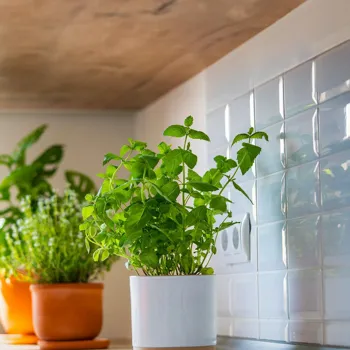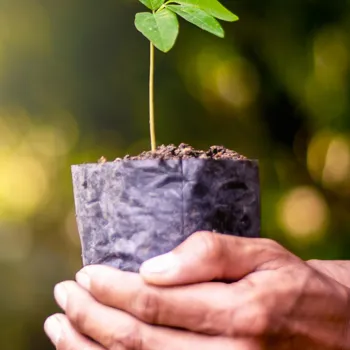Embrace the Green: 7 Steps to Eco-Friendly Living in India. Start small, make a big impact! Read on to begin your journey
In today's world, where climate change is no longer a distant threat but a palpable
reality, embracing an eco-friendly lifestyle is not just a trend, but a necessity. Many of us feel overwhelmed by the idea, imagining grand gestures like installing solar panels or buying an electric car.

However, going green doesn’t require radical changes. It can start with simple, everyday actions that collectively make a significant impact.
So, let’s put on our thinking caps, ditch the doom and gloom, and dive into seven easy steps you can take to kickstart your eco-friendly journey, right here in India!
Rethink Your Shopping Habits: Say Hello to Conscious Consumption
We Indians love a good bargain, and with the rise of online shopping, it's easier than ever to indulge in a bit of retail therapy. But before you click that "Add to Cart" button, take a moment to consider if you really need that item.

Fast fashion, mass-produced goods often come with a heavy environmental price tag, from resource depletion to pollution. Instead of impulse buys, try to shop with intention.
Support local artisans and businesses that prioritize sustainable practices.
Look for products made from recycled materials or those that are designed to last. When buying clothes, opt for natural fibres like cotton, jute, or hemp, which are biodegradable and require less water than synthetic fabrics.
Avoid synthetic materials at all costs as it contributes to microplastic pollution.
Embrace minimalism. Ask yourself if an option other than shopping can serve the intended purpose. Can you borrow that book from the library instead of having to buy it?
Can you repurpose an old container instead of buying a new one? This not only reduces waste but also saves you money, a win-win!
Waste Management: Reduce, Reuse, Recycle – The Holy Trinity
Waste segregation is key to effective recycling. Separate your dry waste (paper, plastic, glass, metal) from your wet waste (kitchen scraps, food waste). Use separate bins for each category, and make sure your family members are also on board.
Many Indian cities have recycling programs, so find out where you can drop off your recyclable materials. If not, encourage your local municipality to start one!
Composting is a brilliant way to deal with your food scraps. You can easily create a compost bin in your garden or balcony.
Composting not only diverts waste from landfills but also produces nutrient-rich soil for your plants. Embrace the joy of using these nutrient rich compost in your indoor plants. Consider reusing glass jars, plastic containers, and shopping bags. Get creative and find new uses for old items.
Turn old t-shirts into cleaning cloths, or use glass jars as storage containers.
Refuse single-use plastics whenever possible. Carry your own reusable water bottle, coffee cup, and shopping bag. Say no to plastic straws, cutlery, and takeaway containers.
A lot of shops now carry reusable products made of metal, bamboo, and even coconut shells. These can be stored easily, are easy to clean and good for the earth.
Conserve Water: Every Drop Counts
India faces severe water scarcity issues, and it’s our responsibility to conserve this precious resource. Simple changes in our daily routines can make a big difference. Take shorter showers. Install water-efficient showerheads and faucets. Turn off the tap while brushing your teeth or shaving.
Sounds basic, right? But many forget.
Fix leaky faucets promptly. A dripping faucet can waste a significant amount of water over time. Learn to harvest rainwater. Rainwater harvesting is a great way to collect and store water for gardening or other non-potable uses.
You can set up a simple rainwater harvesting system on your roof.
Water your plants efficiently. Water them early in the morning or late in the evening to minimize evaporation. Use a watering can or a drip irrigation system to deliver water directly to the roots.
Save Energy: Switch Off and Power Down
Energy conservation is crucial for reducing your carbon footprint. It not only helps the environment but also lowers your electricity bill. Replace your old incandescent bulbs with energy-efficient LED bulbs. LED bulbs use significantly less energy and last much longer.

Make it a rule to switch off lights and fans when you leave a room. Encourage your family members to do the same.
Unplug electronic devices when they are not in use. Many devices continue to draw power even when they are switched off.
Use power strips and switch them off when you are not using the devices connected to them. Optimize your use of appliances. Run your washing machine and dishwasher with full loads. Avoid using the dryer as much as possible and air-dry your clothes instead.
Go Green in the Kitchen: Cook Smart, Eat Sustainably
Your kitchen is a great place to start your eco-friendly journey. From food waste to packaging, there are many ways to reduce your impact. Plan your meals to avoid food waste. Make a shopping list and stick to it. Use leftovers creatively. Store food properly to prevent spoilage.

Buy local and seasonal produce. This reduces the carbon footprint associated with transportation and supports local farmers. Choose foods that are packaged in sustainable materials. Avoid products that are heavily packaged in plastic. Consider buying products in bulk to reduce packaging waste.
Grow your own herbs and vegetables. Even a small balcony garden can provide you with fresh, organic produce. Turn your kitchen waste into compost by composting kitchen scraps and food waste.
Reducing food waste through meal planning and composting reduces your trash, which in turn saves you money and decreases your carbon footprint.
Transportation: Walk, Cycle, or Carpool
Transportation is a major contributor to air pollution. Reducing your reliance on private vehicles can significantly lower your carbon footprint. Walk or cycle whenever possible, especially for short distances. It's good for your health and the environment.
Use public transportation.
Encourage your city to improve its public transport network to make it more convenient and accessible. Consider carpooling with colleagues or neighbours to reduce the number of cars on the road. If you need to buy a car, choose a fuel-efficient or electric vehicle.
Consider walking, biking, or using public transportation, since cars and motorbikes use a lot of energy.
Spread the Word: Inspire Others
The key to creating a truly sustainable world is to inspire others to join the movement. Share your experiences and tips with your friends, family, and colleagues. Encourage them to adopt eco-friendly practices. Education is key to change. Talk to them on how to reduce their carbon footprint.

Participate in community events that promote sustainability. Organize cleanup drives, tree planting campaigns, or workshops on eco-friendly living. Use social media to raise awareness about environmental issues and promote sustainable practices.
By working together, we can create a greener, healthier, and more sustainable future for India.
Remember, every small step counts. Don't get discouraged if you can't do everything perfectly. Just focus on making gradual changes and incorporating eco-friendly practices into your daily life.
Together, we can make a difference!
These steps are about taking conscious actions. These can be taken over time and you will find yourself becoming and eco-friendly citizen.
Change is difficult and you should not get discouraged.
You can support local activities like rallies and fund raising to accelerate the awareness.
The best thing to embrace eco-friendly lifestyles is that it saves you money.
It requires commitment but you will start seeing the benefits slowly.
Embracing eco-friendly practices improves your overall health and well-being.
AI Generated Content. Glance/InMobi shall have no liability for the content



















